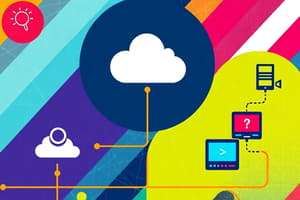Podcast
Questions and Answers
Traditional hardware devices exist independently, and their reliability depends only on ______.
Traditional hardware devices exist independently, and their reliability depends only on ______.
software
The performance of a single ______ is limited.
The performance of a single ______ is limited.
device
With virtualization technology, computer components run on the ______ environment.
With virtualization technology, computer components run on the ______ environment.
virtualization
Cloud computing enables ubiquitous, convenient, on-demand network access to a shared pool of ______.
Cloud computing enables ubiquitous, convenient, on-demand network access to a shared pool of ______.
Cloud transformation changes data centers from resource silos to resource ______.
Cloud transformation changes data centers from resource silos to resource ______.
The term 'cloud' is a metaphor for ______ and the Internet.
The term 'cloud' is a metaphor for ______ and the Internet.
Cloud computing can be viewed as the delivery of on-demand, measured computing services over the ______.
Cloud computing can be viewed as the delivery of on-demand, measured computing services over the ______.
Cloud architecture shifts from centralized to ______ architecture.
Cloud architecture shifts from centralized to ______ architecture.
Cloud computing provides ______ access through the internet.
Cloud computing provides ______ access through the internet.
With cloud computing, resources can be ______ on demand.
With cloud computing, resources can be ______ on demand.
Users can utilize cloud computing services without ______ assistance.
Users can utilize cloud computing services without ______ assistance.
Cloud computing employs a method called ______ pooling to optimize resource use.
Cloud computing employs a method called ______ pooling to optimize resource use.
Services in cloud computing are typically ______, meaning users are billed based on their usage.
Services in cloud computing are typically ______, meaning users are billed based on their usage.
Examples of cloud music services include NetEase Cloud Music and ______ Music.
Examples of cloud music services include NetEase Cloud Music and ______ Music.
HUAWEI CLOUD Meeting supports interactive video and voice communications for ______ locations.
HUAWEI CLOUD Meeting supports interactive video and voice communications for ______ locations.
E-Gov Cloud Online Services provide public services through the ______.
E-Gov Cloud Online Services provide public services through the ______.
A hybrid cloud is a combination of a public cloud and a private cloud or ______ resources.
A hybrid cloud is a combination of a public cloud and a private cloud or ______ resources.
Infrastructure as a Service (IaaS) provides infrastructure such as servers, storage devices, networks, and ______ resources.
Infrastructure as a Service (IaaS) provides infrastructure such as servers, storage devices, networks, and ______ resources.
In Platform as a Service (PaaS), users only need to focus on ______ and data.
In Platform as a Service (PaaS), users only need to focus on ______ and data.
Software as a Service (SaaS) provides all resources, services, and ______.
Software as a Service (SaaS) provides all resources, services, and ______.
Cloud computing integrates hardware resources into one in software and dynamically allocates the resources to ______ in software.
Cloud computing integrates hardware resources into one in software and dynamically allocates the resources to ______ in software.
By building high-specification cloud data centers and introducing automatic ______ technology, data storage becomes more centralized.
By building high-specification cloud data centers and introducing automatic ______ technology, data storage becomes more centralized.
Cloud service-oriented mode offers IT devices as services that allow customers to select on ______.
Cloud service-oriented mode offers IT devices as services that allow customers to select on ______.
Cloud computing achieves energy saving, emission reduction, and easier ______.
Cloud computing achieves energy saving, emission reduction, and easier ______.
Before virtualization, software and specified hardware are bound together, but after virtualization, software can be freely migrated on all ______.
Before virtualization, software and specified hardware are bound together, but after virtualization, software can be freely migrated on all ______.
Elastic computing means that IT resources can be ______ provided.
Elastic computing means that IT resources can be ______ provided.
Based on the situation of small and micro startups, low-cost software is required to earn money at small profits but ______ turnover.
Based on the situation of small and micro startups, low-cost software is required to earn money at small profits but ______ turnover.
Cloud computing data centers are geographically ______ and their performance varies by region.
Cloud computing data centers are geographically ______ and their performance varies by region.
Cloud computing offers ______ self-service, allowing customers to deploy services based on actual requirements.
Cloud computing offers ______ self-service, allowing customers to deploy services based on actual requirements.
The public cloud has a large number of users with different requirements, thus advanced ______ technologies must be adopted.
The public cloud has a large number of users with different requirements, thus advanced ______ technologies must be adopted.
Cloud services can be accessed from various clients such as mobile phones, laptops, and ______.
Cloud services can be accessed from various clients such as mobile phones, laptops, and ______.
In resource pooling, computing resources are ______ so that customers can rent services.
In resource pooling, computing resources are ______ so that customers can rent services.
Cloud computing features quick deployment and ______, allowing customers to rent unlimited resources.
Cloud computing features quick deployment and ______, allowing customers to rent unlimited resources.
Cloud services are billed based on ______ resource usage, such as CPU and memory.
Cloud services are billed based on ______ resource usage, such as CPU and memory.
One characteristic of cloud computing is its ______ scale, centralizing IT resource supply.
One characteristic of cloud computing is its ______ scale, centralizing IT resource supply.
Homogeneity in cloud computing implies a level of ______, ensuring compatibility among various devices.
Homogeneity in cloud computing implies a level of ______, ensuring compatibility among various devices.
Virtualization allows for smaller computing units, much like dividing a ______ into pieces to share.
Virtualization allows for smaller computing units, much like dividing a ______ into pieces to share.
Study Notes
Traditional IT Architecture Challenges
- Traditional hardware is independent, with reliability tied solely to software.
- Heterogeneous devices and vendors complicate management.
- Single device performance is constrained, leading to low utilization and high costs.
Cloud Architecture Migration
- Enterprises are moving to cloud architecture to improve efficiency and reduce costs.
- Transition involves shifting from localized, power-intensive setups to cloud-based resource pooling.
- Virtualization technology allows software to run independently of physical hardware, optimizing utilization.
Definition of Cloud Computing
- Cloud computing enables on-demand network access to shared computing resources with minimal management effort.
- Key characteristics include:
- Broad network access
- Fast scaling capabilities
- On-demand self-service features
- Resource pooling
- Metered services
Cloud Computing in Daily Life
- Significant applications include:
- Cloud albums (Baidu Cloud, iCloud)
- Cloud music (NetEase, Kugou, Kuwo, Xiami)
- Cloud video services (Baidu Cloud, Tencent Cloud Video)
- Cloud document solutions (Youdao Note, Shimo)
Enterprise Cloud Services
- HUAWEI CLOUD Meeting facilitates video and voice communication across locations, crucial for collaboration.
- Video conferencing market in China grows over 20% annually, yet only a small fraction of enterprises utilize it.
- E-Government cloud offers public services via the Internet, enhancing access to IT services comparable to utilities.
Hybrid Cloud Model
- Combines public cloud, private cloud, and on-premises resources while maintaining distinct entities.
- Offers flexible workload management across different cloud environments.
Cloud Computing Service Models
- IaaS (Infrastructure as a Service): Provides infrastructure; users manage system and application layers.
- PaaS (Platform as a Service): Offers application deployment environments with a focus on applications and data.
- SaaS (Software as a Service): Delivers full resources and services; users interact solely with applications.
Benefits of Cloud Computing
- Integrates hardware resources in software, enhancing resource allocation efficiency.
- Supports automatic scaling, optimizing workflow performance.
- Promotes centralized data storage, leading to energy savings and easier maintenance.
- Key benefits include:
- On-demand self-service
- Broad network access from multiple device types
- Resource pooling allowing dynamic resource allocation
- Quick deployment and scalability
- Metered billing based on actual resource usage
Core Characteristics of Cloud Computing
- Massive scale allows centralized IT resource supply, differentiating it from conventional IT.
- Homogeneity standardizes services akin to utilities.
- Virtualization improves resource utilization and decouples software from hardware.
- Elastic computing provides flexible resource availability.
- Low-cost software promotes market competitiveness and accessibility.
- Geographic distribution enables global service access.
- Service orientation emphasizes a design focused on delivering services.
- Advanced security technologies ensure user data protection in public cloud environments.
Studying That Suits You
Use AI to generate personalized quizzes and flashcards to suit your learning preferences.
Related Documents
Description
This quiz explores the challenges faced by traditional IT architecture and the transition to cloud computing. It covers definitions, key characteristics, and real-life applications of cloud computing. Test your knowledge on how virtualization technology enhances efficiency and optimizes resource utilization.




